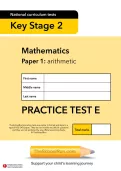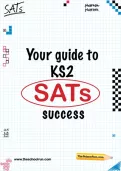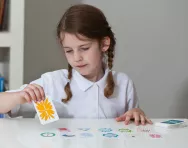Important update from TheSchoolRun
For the past 13 years, TheSchoolRun has been run by a small team of mums working from home, dedicated to providing quality educational resources to primary school parents. Unfortunately, rising supplier costs and falling revenue have made it impossible for us to continue operating, and we’ve had to make the difficult decision to close. The good news: We’ve arranged for another educational provider to take over many of our resources. These will be hosted on a new portal, where the content will be updated and expanded to support your child’s learning.
What this means for subscribers:
- Your subscription is still active, and for now, you can keep using the website as normal — just log in with your usual details to access all our articles and resources*.
- In a few months, all resources will move to the new portal. You’ll continue to have access there until your subscription ends. We’ll send you full details nearer the time.
- As a thank you for your support, we’ll also be sending you 16 primary school eBooks (worth £108.84) to download and keep.
A few changes to be aware of:
- The Learning Journey weekly email has ended, but your child’s plan will still be updated on your dashboard each Monday. Just log in to see the recommended worksheets.
- The 11+ weekly emails have now ended. We sent you all the remaining emails in the series at the end of March — please check your inbox (and spam folder) if you haven’t seen them. You can also follow the full programme here: 11+ Learning Journey.
If you have any questions, please contact us at [email protected]. Thank you for being part of our journey it’s been a privilege to support your family’s learning.
*If you need to reset your password, it will still work as usual. Please check your spam folder if the reset email doesn’t appear in your inbox.
Countdown to SATs: your action plan

Statutory Assessment Tests (SATs) help teachers to learn more about how well your child is doing in core subjects, including maths and English. Year 2 (KS1 SATs) are optional and may be administered in May. Year 6 (KS2 SATs) are compulsory and will also be taken in May.
With just weeks to go until the tests, schools will be working hard to prepare children to do their best. But a little extra effort at home will make sure your child goes into the tests feeling on top of their game.
Our six-week action plan will help your child feel SATs-ready.


Prepare your child for SATs today
- Your guide to SATs
- KS1 & KS2 SATs revision courses
- SATs practice papers in English & maths
Week one: Get prepared
- Talk to your child about SATs, so they know what to expect. Bear in mind that many schools keep KS1 SATs very low profile; the tests are often integrated into classwork, and children may not even know they're taking them, so don't worry if your child seems to know nothing.
- Ask them if they’re unsure about anything they’ve been learning at school, so you’re aware of subjects they may want some extra help with.
- Talk to your child's teacher about whether there are areas where they could do with extra practice. If your child has a parents' evening coming up, it's a good idea to take them along so they can hear what their teacher thinks they should work on.
- If you're confused about the terminology your child is using and are unsure how to help, head to our primary school literacy, numeracy and grammar glossaries for an explanation of all those technical terms.
Week two: Start practising
- Get your hands on some practice materials. You can download our free SATs past papers, as well as subscriber-exclusive mock papers (developed for TheSchoolRun to offer children extra practice).
- Look through our KS1 SATs Learning Journey and KS2 SATs Learning Journey for revision worksheets.
- Encourage your child to complete practice papers under exam conditions: in silence, without asking questions, and in the allotted time. Some kids struggle to complete the papers in time, but the more they practise, the faster they'll get.
- Not sure how to make the best of practice materials? We explain how to use KS2 English and maths past papers.
- Make sure they still have time to play, relax and read for pleasure (which builds vocabulary: an important part of SATs success): children need time to chill if they're to do their best.
Week three: Encourage a study habit
- Draw up a study plan together, including incentives for the end of each week.
- Provide your child with a quiet space in which to work. Be on hand to help if you're needed, but make sure they do the work themselves.
- Focus on the key skills of maths and English. Check out our SATs helpers for KS1 English and maths, and KS2 English and maths.
- Remember, you can't sit the tests for your child, so focus on helping them develop independent study skills rather than spoon-feeding them answers.
Week four: Work on weaknesses
- Try to set aside time to help them work on these tricky subjects. If you're not sure what you should focus on, ask their teacher for guidance.
- Spend time focusing on these with our revision tips and tricks.
- When your child does a past paper, compare their marks to their previous tests: chances are they'll have improved their result, which will give their confidence a boost.
- Make sure they're really fluent in their times tables, as this will help them work quickly on their maths papers. Try our teachers' tricks for times tables, or download a times tables app to make practice fun.
- If you're worried about how much your child is struggling, speak to their teacher. They may qualify for special provisions, such as extra time or being allowed to type their answers, but the teacher needs to apply for these in advance.
Week five: Relax!
- Make sure that your child takes time between school and study to relax for a short time with their games console or by watching TV.
- Time out allows their body and brain to recharge, which helps concentration.
- Calm their fears with these essential relaxation tips.
- If there are concepts that they're finding hard to remember, help them develop memory tricks that'll make it easier for them to recall difficult spellings or maths rules.
- Find out whether their school is running optional revision sessions; children are often more willing to study under their teacher's supervision than they are at home.
Week six: Be positive
- Praise your child for all their hard work, and encourage them to make a list of five things they’re proud of.
- Keep up the revision, but instead of grilling them with past papers, let them do 10-minute tests, worksheets or puzzles that feel less daunting. Think of it a bit like tapering runs before a marathon: the hard work is done, and now they just need to keep up the momentum.
- Try some simple relaxation or mindfulness exercises to help them keep their cool.
- Make sure they eat well to make sure they're able to concentrate. Try these brilliant brain-boosting breakfast ideas for SATs days.
- Ensure they get plenty of sleep so they feel refreshed on the morning of their test. Beware of distractions such as too much screentime near to bedtime.







